What Is Geoblocking and How to Avoid It?
If you’re trying to access a certain website or platform and receive a “This content is unavailable in your country” message, it’s likely blocked due to geographical limitations. To be more specific, it means that an online service, government, or your Internet service provider (ISP) has detected your location through your IP address and denied access to the desired content. So, what is geoblocking and is there any way to get around it? Keep reading to find out.
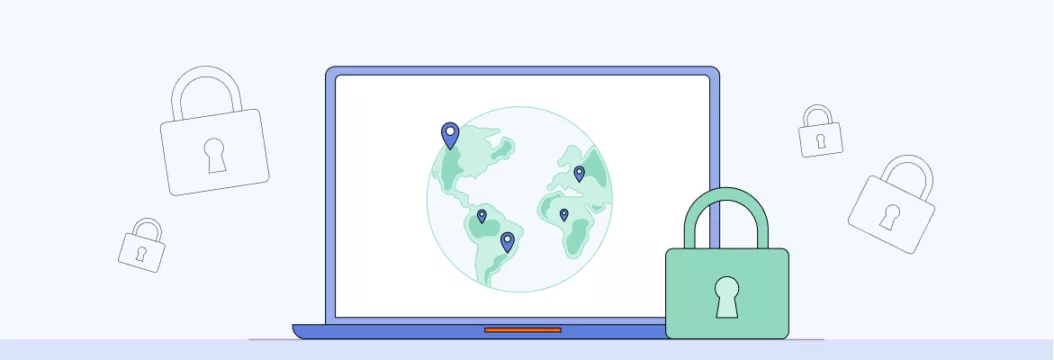
What is geoblocking?
Geoblocking is restricting or limiting users’ access to a particular online service, website, or web page based on their current location. When you’re browsing the Internet, many third parties, including the sites you’re visiting, can see where you are. So if you’re trying to access region-locked or censored content, they won’t let you in.
But why do those limitations take place? Here are the two most common reasons.
Main reasons for geographical limitations
Most often, content is blocked in a particular country or region either because of licensing agreements or local laws and censorship. Let’s talk about both causes in more detail.
- Content licensing and copyrights. Some content may belong to a particular service provider only in some countries, while in others somebody else owns it. For example, the popular adult animated series Rick and Morty is unavailable on Netflix US (instead, you can watch it on Hulu Plus and HBO Max). But it’s included in many European Netflix catalogs, including Spain, France, Italy, Ukraine, and the UK.
- Online censorship. Some governments impose geoblocks to prevent their citizens from viewing certain content due to strict Internet censorship. For instance, many extremely popular websites and apps, including Facebook, Twitter, YouTube, Netflix, and even Google, are unavailable in China.
Now that you know what geoblocking is and why you may encounter it, it’s time to explore how these limitations work.
How does geoblocking work?
As mentioned above, geoblocking is based on your physical location. A website or service sees your IP address – a unique set of characters that determines the network your device is connected to – and decides whether to allow or deny your access. Let’s take a closer look at this process.
- A network you’re connected to provides your device with an IP address. It’s visible not only to you, but also to the Internet service provider (ISP) responsible for your Internet connection.
- Every time you attempt to visit a website, your request travels to its server along with your IP address.
- A website uses your IP to process your request and learn where it came from.
- Now, the website you’re trying to visit knows your geographical location. So if it’s unavailable for users there, it will send you the same old message – “This content is unavailable in your country.”
Note that a common IP blocking technique is usual for online services unavailable due to copyright and licensing limitations. However, governments in countries with limited online freedom, such as China and Iran, apply even more advanced content blocks, such as Deep Packet Inspection (DPI), firewalls, and so on.
But either due to licensing rules or local restrictions, geoblocking may become a significant problem, especially if you’re on your vacation or work trip and can’t access the content of your choice.
What content is usually blocked?
Here are some examples of the content you may struggle to access while away from home.
Media streaming platforms like Netflix
The biggest media streaming services, such as Netflix and Amazon Prime, are available in many parts of the world (nearly 190 and 100 countries, respectively). But due to licensing limitations mentioned above, the catalogs of these streaming giants vary depending on the location. So you may find your beloved show unavailable in the country you’re visiting. To learn more, read our detailed comparison of Netflix in the US and UK.
What’s more, some other popular streaming platforms aren’t represented in so many locations. For instance, Hulu works only in the US. HBO Max and Dinsey Plus are currently available in only 60 countries. Also, many local streaming services, such as Voot in India, can’t be accessed elsewhere. And if you’re temporarily visiting a country that’s not on the list, you will get that frustrating error message:
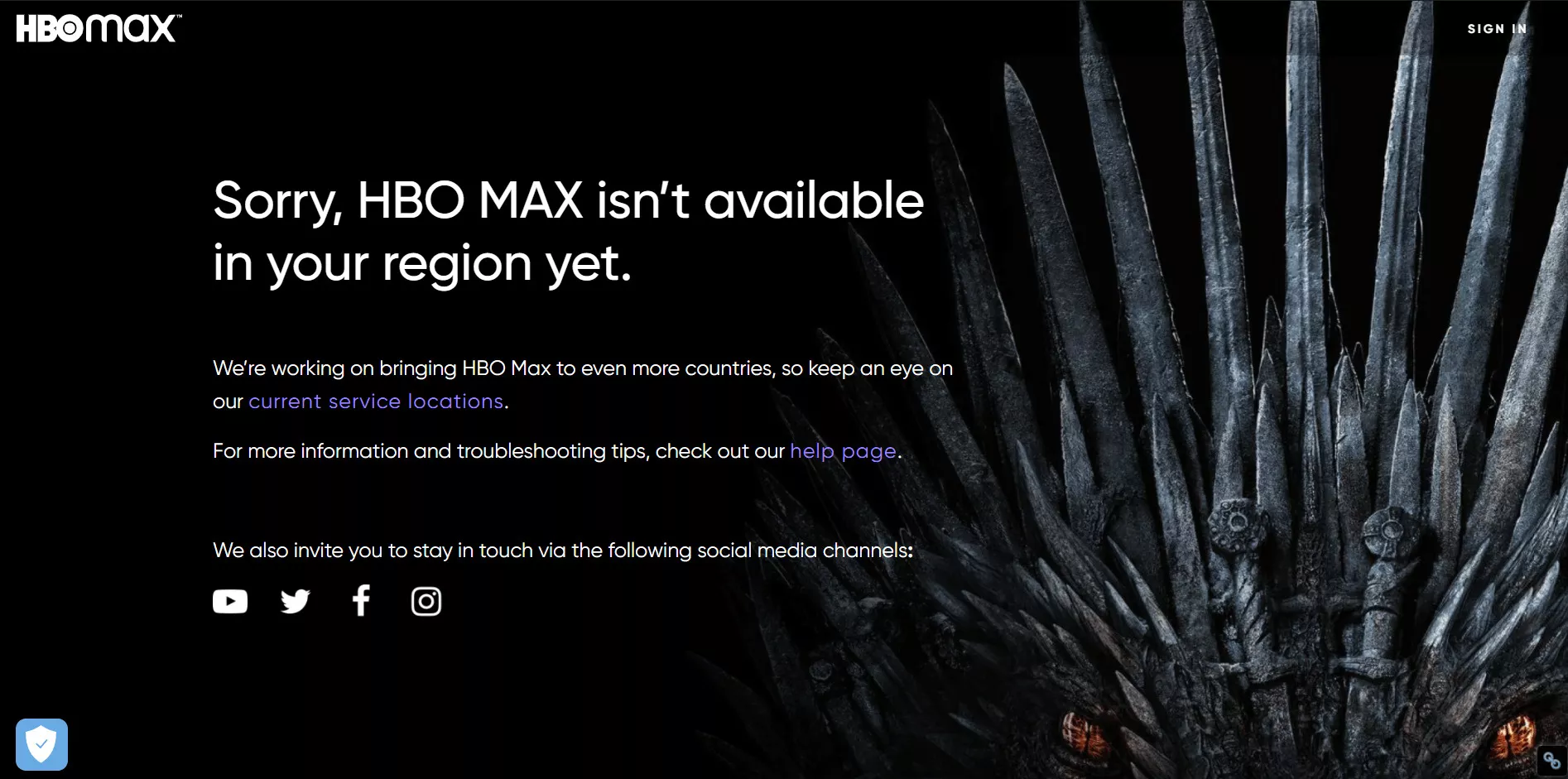
Spotify and other music streaming services
Spotify, Apple Music, and YouTube Music are also not available everywhere in the world. So when going abroad, it might be challenging for you to listen to your favorite artists and bands without the need to pay per song. Moreover, some of your beloved songs can be grayed out – and again, that’s due to licensing agreements with record labels.

YouTube videos
You may have noticed that some YouTube videos won’t play in your region. The problem is that a major part of YouTube content is uploaded by fans who don’t actually own it. As a result, the real owners of this content may require them to limit access to those videos to particular regions due to copyright limitations.

Live sports events
When it comes to sporting events, things get even more complicated. That is because such content can be distributed by multiple channels, platforms, and services, from big corporations like ESPN and FOX Sports to small local broadcasters. Therefore, the right to air a football or NBA match may belong to several companies in different regions. For example, Hulu + Live TV may broadcast a Lakers game in New York, but not in L.A. where some other distributor has exclusive rights to air it.
Social networks
The main reason for applying geoblocks to social media platforms is strict Internet censorship. For instance, you won’t be able to access your Facebook, Twitter, Instagram, or Snapchat account in China. The Indian government has restricted the use of TikTok and WeChat. Also, many popular social networking sites are banned in Iran, North Korea, Turkmenistan, and Russia.
Gambling and sports betting websites
Online casinos, lotteries, and sports betting websites are illegal in many parts of the world, including the United Arab Emirates, Singapore, Qatar, North Korea, Japan, Cyprus, and Poland. As for the USA, some forms of online gambling are allowed in most states, apart from Utah and Hawaii. Still, in many other countries and regions, there are lots of limitations in this regard. So if you’re a passionate gambler, you may face difficulties accessing your favorite sites while traveling.
How to bypass geoblocking
Luckily, there are several tools allowing you to access the desired service, website, or app blocked in a particular country or region. Let’s look at the most common options in more detail, considering their pros and cons.
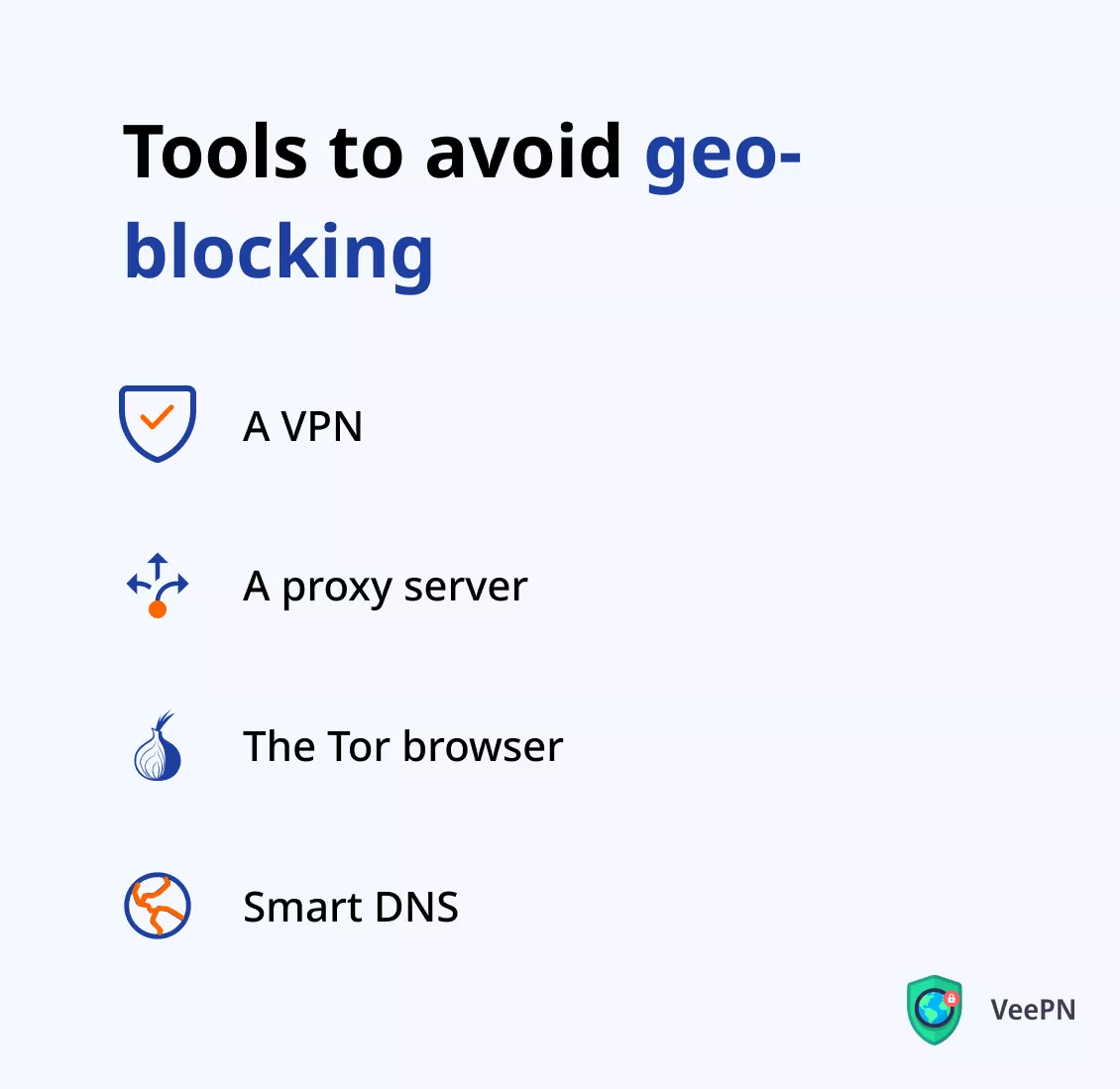
Proxy servers
A proxy server provides a transitional destination for your traffic before it moves to the server of the requested website. The main purpose of a proxy is to give you an alternative IP address instead of your actual one. This way, you can reach online resources and services blocked in your current location.
To be more precise, here’s how a proxy server works:
- You type the desired URL in your browser’s search bar.
- Your request travels to a proxy server.
- Your IP is altered with this server’s address.
- Proxy redirects your request to the destination server (the website you need to access)
- The response from the website travels back to the proxy server and then returns to your device.
A proxy server can be an effective way to get around geoblocking. However, they also have some significant downsides. If you want to learn more, read our blog post about the difference between proxies and VPNs. Here, we will just outline the main benefits and drawbacks of using proxies to access geo-limited content.
Pros and cons of proxies
Pros:
- Ease of use. You don’t need to run a multi-step installation process for using proxies. Just set up a proxy on your browser, connect to a server – and you’re ready to go.
- Changed IP. As mentioned above, a proxy server alters your IP address, which is mostly enough to access content limited in your current location.
Cons:
- Intrusive ads. Free proxies make a profit by displaying tons of ads to users, which can be quite annoying.
- Lack of encryption. A proxy server doesn’t encrypt your data while moving it through a third-party server. So online snoopers can still monitor your browsing activities.
- Security issues. Free proxy solutions may compromise your online safety by collecting your private data and selling it to ad agencies.
The Tor browser
The Onion Router (Tor) is a privacy-focused browser that allows users to remain untraceable on the web. Its main goal is to ensure anonymous communications and provide access to .onion websites on the dark web. However, Tor is also relatively suitable for bypassing geoblocks.
Here is how Tor works:
- After you download and install Tor on your device, you enter the Tor network. The Tor browsing process is also known as onion routing.
- Every request goes through multiple nodes before reaching its final destination. First, it arrives at the guard node.
- Next, your traffic moves through middle nodes that encrypt your data on multiple levels.
- Finally, your request undergoes the exit node. Here, your data is decrypted and reaches the desired website server. Then, the reverse process occurs.
Indeed, Tor is a powerful privacy solution. But it’s not 100% secure. For more details, read our overview of Tor’s vulnerabilities. Now, is it a good idea to avoid geoblocking with Tor? Let’s look at its main pros and cons to find out.
Pros and cons of Tor
Pros:
- Anonymity. Tor is designed to keep users’ data undetectable on the web. For this purpose, it provides multi-layer encryption.
- Free access. Tor is completely free of charge as it’s run by privacy enthusiasts and volunteers.
Cons:
- No server choice. You can’t select a specific server location with Tor, so it won‘t let you access content in a particular country.
- Slower speeds. Due to complex encryption and decryption processes, Tor works much slower than common browsers. That’s why it’s not the best option for traffic-intensive activities like media streaming and online gaming.
- Potential security problems. Tor enhances your privacy, but it’s not an ultimate cyber security solution. Moreover, many websites on the dark web are spoofed and infected with dangerous malware.
A virtual private network (VPN)
A VPN is an online security and privacy solution that changes your IP address and reroutes your traffic through an encrypted tunnel. Simply put, a good VPN service combines the main benefits of proxies and Tor. On the one hand, it allows you to choose the desired server location to access content unavailable in certain countries. On the other hand, it enhances your online safety thanks to end-to-end encryption and powerful security features.
So how does a VPN work, exactly? Let’s take a glimpse at this process.
- After you pick the most suitable server location and turn your VPN on, your entire Internet traffic gets encrypted by VPN.
- When your request arrives at the chosen VPN server, it changes your IP address and encrypts your data. This way, neither your ISP nor the website you want to access can trace its further movement.
- While your data travels through the encrypted tunnel, it’s handled by VPN protocols, such as OpenVPN, IKEv2/IPsec, or WireGuard. These are rules that define the specifics of your connection, including its security, speed, and data encryption.
- The website you’re trying to reach gets the IP of the VPN server you’re using. So it can’t detect where the request actually came from. At this point, your data is decrypted and sent back to your device.
So is it worth using a VPN to overcome geoblocking? Here are the most significant benefits and drawbacks of this solution.
Pros and cons of a VPN
Pros:
- End-to-end encryption. A VPN encrypts your traffic and prevents third parties from tracking your online activities. Moreover, unlike proxy servers, it also protects you from DNS and IP leakage risks.
- Enhanced security. Apart from providing access to the desired content, premium VPNs offer multiple cybersecurity features to avoid public Wi-Fi risks, malware, phishing attacks, and other online threats.
- Intuitiveness. You can set up and run a VPN in a few simple steps – we will explain this process in a bit.
- Effectiveness. When it comes to avoiding geoblocks, a VPN is much more effective than its alternatives. Even if you can’t access a particular website or service, switching to another VPN server will get the job done.
Cons:
- Paid services. There are many free VPNs available, but they are often inefficient and may compromise your privacy. Reliable services are mostly subscription-based.
- A slight slowdown of connection speed. The encryption and decryption processes may reduce your Internet speed to some degree. However, with reputable services like VeePN, you will hardly notice the difference.
All in all, if you need to access the desired content when traveling, a good VPN is your best bet. Here’s how to use it to circumvent geographical limitations.
How to get around geoblocking with a VPN
Take the following steps to avoid geoblocks and access the desired websites or services with VeePN.
- Download and install a VPN app on your device. VeePN is a multi-platform solution that supports various types of devices and operating systems, including iOS, Android, Windows, macOS, and Linux.
- Choose the most suitable VPN server. For instance, if you’re temporarily visiting Europe and need to access your Hulu account, select a US-based server.

- Pick a VPN protocol. IKEv2/IPsec is considered the best VPN for streaming media when traveling since it provides good speeds and effectively overcomes geoblocks.
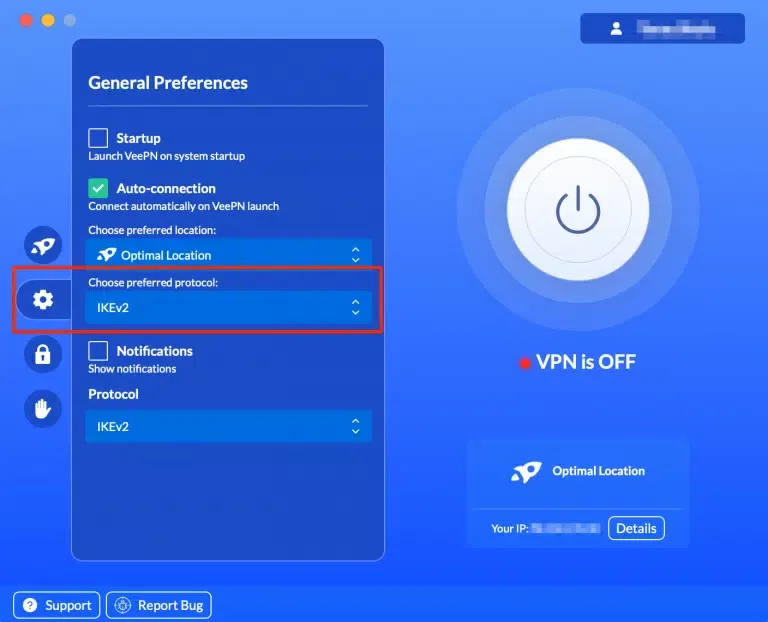
- Turn your VPN on. Simply tap that big button in your VeePN app – and enjoy your browsing freedom.
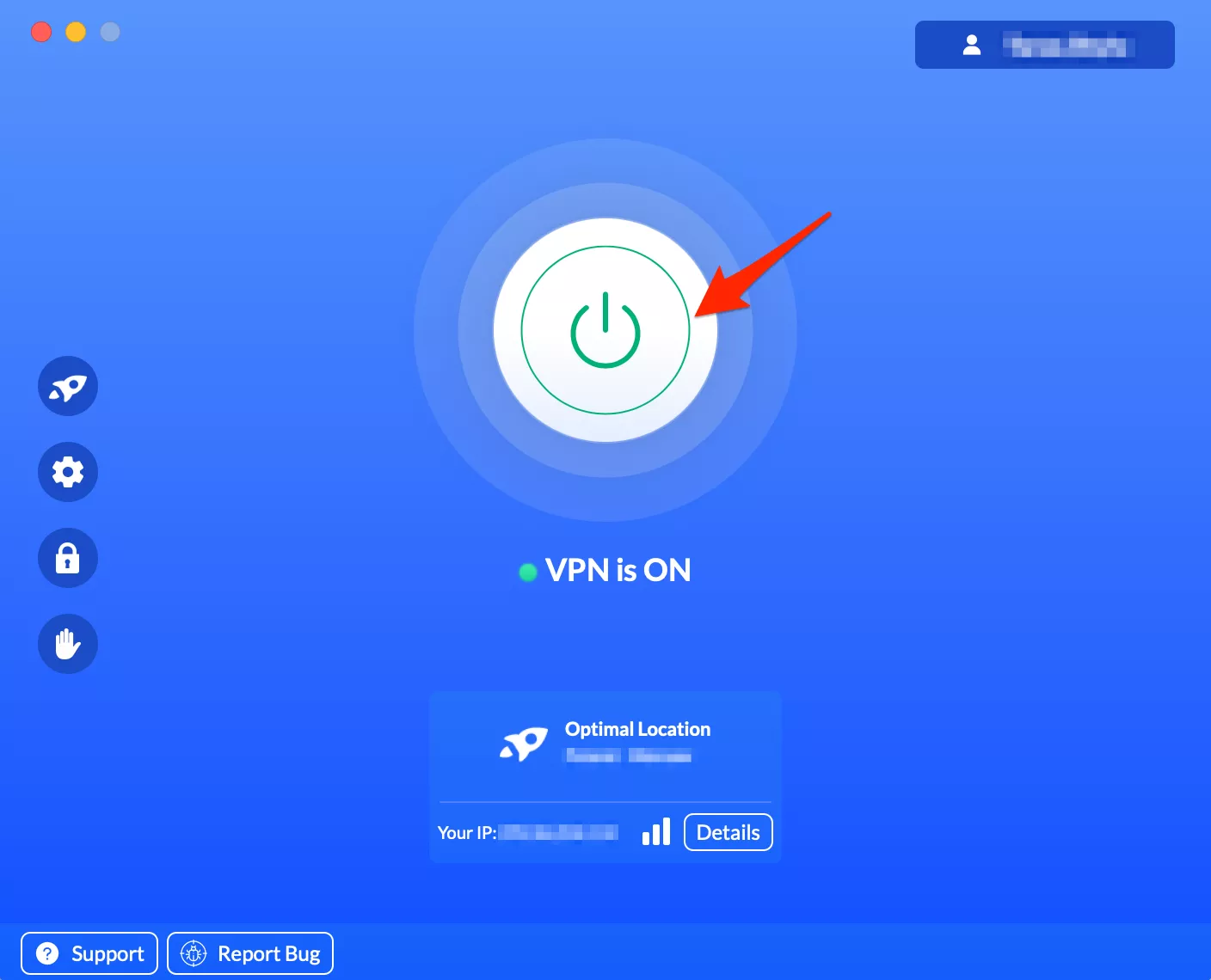
Note that VeePN does not promote, condone, or encourage using a VPN in ways that would potentially violate Terms of Service of streaming service providers. For more details, please read the VeePN Terms of Service.
Access the desired content with VeePN
If you need a simple and efficient solution to get your hands on geo-blocked content when traveling, try VeePN. It’s a reputable VPN service offering an extensive server network covering 89 locations in 60 countries worldwide. Besides, VeePN will protect your data with top-grade AES-256 encryption and boost your cybersecurity with many powerful features like NetGuard, Kill Switch, and Double VPN.
Choose a VeePN plan and safeguard yourself with a 30-day money-back guarantee!
FAQ: What Is Geoblocking?
In most cases, geoblocking of media streaming content is a lawful way to protect particular licensing agreements. It becomes illegal only if it violates some existing regulations. An example of an unjustified geoblocking practice is when the citizens of some European Union countries cannot buy goods online in other parts of the EU. As for online censorship restrictions, they are mostly legal in countries with authoritarian governments.
You can overcome geoblocks using one of the following tools:
- A proxy server
- The Tor browser
- A VPN
To learn more about the pros and cons of these methods, read this article.
In general, getting around geographical limitations while traveling is legal, as well as the use of VPNs, proxies, and Tor (these tools are restricted only in several countries worldwide). However, some online services, such as streaming platforms, may consider it a violation of their Terms of Service. Note that VeePN is the VPN service not intended to be used for bypassing copyright regulations or other illegal behavior. For more details, please read the VeePN Terms of Service.
VeePN is freedom





